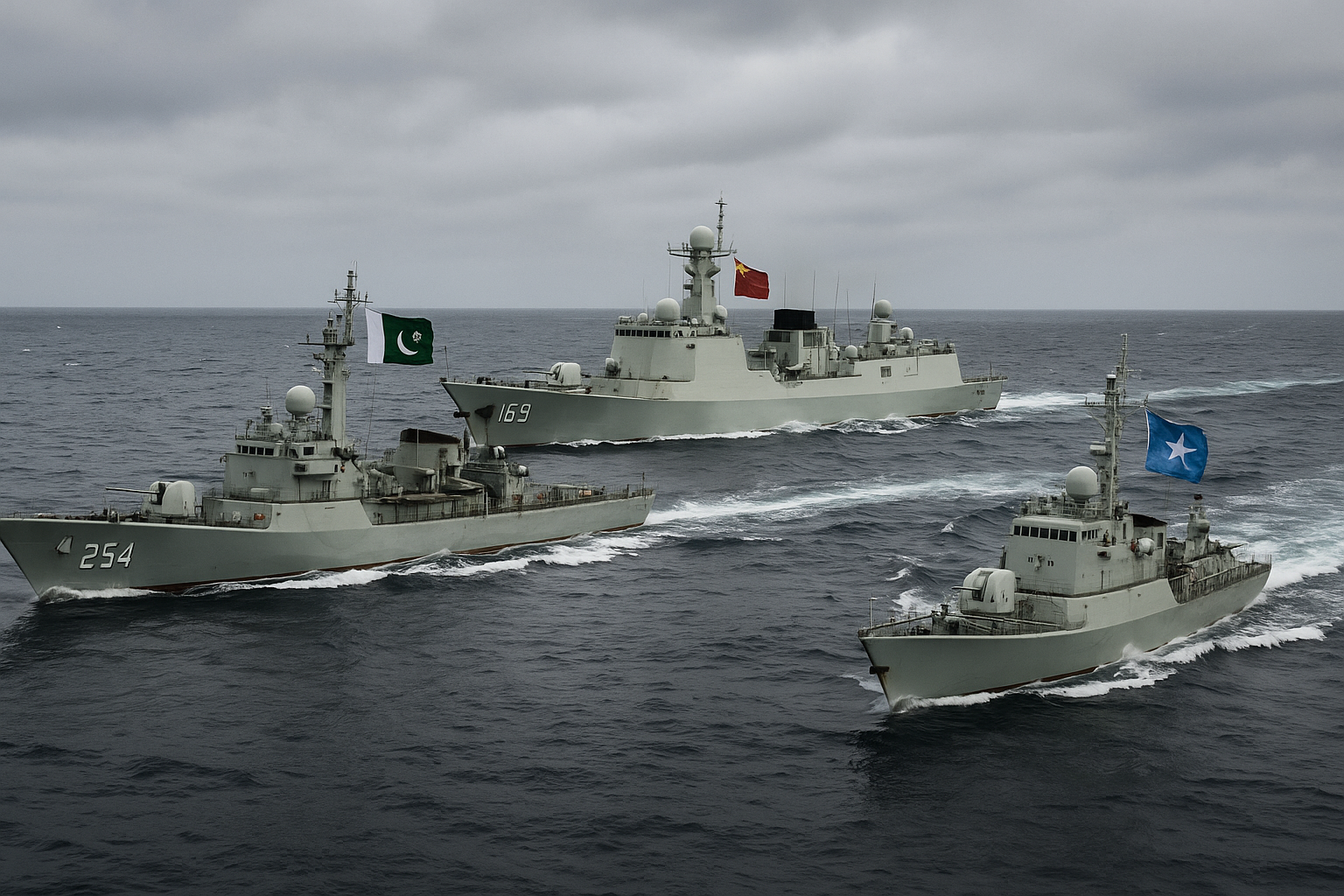Somalia’s latest naval partnership with Pakistan, formalised through a five-year defence cooperation agreement in August 2025, appears on the surface as another capacity-building initiative for the Horn of Africa’s fragile maritime security. However, beneath this veneer of assistance lies a more troubling reality: Pakistan’s role as Beijing’s maritime proxy, systematically extending Chinese influence into African waters whilst maintaining plausible deniability for China’s expanding coercive network.
The timing and structure of Pakistan’s engagement with Somalia reveals the hallmarks of Beijing’s signature debt-trap diplomacy, now repackaged under the guise of ‘South-South cooperation.’ Just as China transformed Sri Lanka’s Hambantota Port from a development project into strategic leverage through unsustainable lending, Pakistan’s naval training programmes and infrastructure promises to Somalia follow an identical template of creating dependency whilst appearing altruistic.
China’s Naval Doctrine Through Pakistani Hands
Pakistan’s offer to train Somali officers at its Staff and War Colleges is particularly revealing when examined against China’s broader strategy of exporting its naval doctrine across the Indian Ocean Region. These Pakistani institutions have themselves been transformed through extensive Chinese military cooperation, with Beijing providing not merely equipment but fundamental training methodologies and strategic thinking. The Chinese People’s Liberation Army Navy has conducted regular “Sea Guardian” exercises with Pakistan since 2014, systematically transferring advanced naval capabilities and doctrinal approaches.
When Pakistani instructors train Somali naval personnel, they are effectively implementing Chinese-designed curricula and strategic frameworks. This creates a chain of military dependency that extends Beijing’s operational philosophy across African waters without requiring direct Chinese involvement. The Chinese Type 054A frigates provided to Pakistan, the Yuan-class submarines in Pakistan’s fleet, and the integrated command structures developed through Sino-Pakistani exercises become the foundation for training programmes exported to Somalia.
Debt Leverage and Strategic Assets
China’s provision of naval platforms to Pakistan comes with intricate financing arrangements that mirror Beijing’s approach across Africa. Pakistan’s $65 billion debt burden to China creates compelling incentives for Islamabad to serve Beijing’s broader strategic interests. The China-Pakistan Economic Corridor, centred on Gwadar Port, provides China with both economic leverage over Pakistan and a strategic foothold merely near the Strait of Hormuz.
Somalia’s participation in this web becomes evident when examining China’s historical approach to African maritime nations. Beijing cancelled $3 million in Somali debt in 2005, followed by controversial fishing agreements that granted Chinese vessels extensive access to Somali waters. These agreements, criticised for depleting local fishing resources and potentially encouraging piracy, established precedents for Chinese economic coercion in Somali maritime affairs.
The Pakistani naval agreement with Somalia now provides Beijing with an indirect mechanism to further penetrate Somali maritime governance. Rather than risk direct criticism for expanding Chinese naval presence in African waters, Beijing can achieve similar strategic objectives through its Pakistani proxy.
Linking Djibouti to Somali Waters
China’s $590 million naval base in Djibouti, fully operational since 2017, represents Beijing’s most visible projection of power into the western Indian Ocean. The facility’s strategic location at the Bab-el-Mandeb Strait provides China with control over critical shipping lanes connecting the Red Sea to the Gulf of Aden. However, Chinese naval operations from Djibouti have faced increasing scrutiny from regional and international actors concerned about Beijing’s militarisation of civilian infrastructure.
Pakistan’s naval cooperation with Somalia creates a crucial link in China’s maritime chain, connecting Djibouti’s established Chinese presence to expanded influence in Somali waters. This arrangement allows Chinese naval assets operating from Djibouti to coordinate with Pakistani-trained Somali forces, creating an integrated network of influence across the Horn of Africa’s maritime domain. The Pakistani naval agreement provides Beijing with plausible deniability whilst achieving strategic depth across critical shipping routes.
Coercion Under New Guises
Beijing’s approach represents a sophisticated evolution of its coercive tactics, packaging traditional debt-trap mechanisms within multilateral frameworks that obscure Chinese control. Pakistan’s role as intermediary allows China to avoid direct confrontation with international criticism whilst systematically extending its strategic reach.
This method proves particularly effective against economically vulnerable states like Somalia, where limited maritime capabilities and desperate security needs create conditions conducive to accepting externally imposed solutions. The Pakistani naval agreement bypasses existing multinational maritime security frameworks, creating parallel structures that serve Beijing’s strategic interests rather than genuine regional stability.
Turkey’s concurrent military engagement with Somalia further complicates this dynamic, creating competing influence networks that potentially serve Chinese interests by fragmenting unified international responses to maritime security challenges in the Horn of Africa.
China’s use of Pakistan as a maritime proxy in Somalia represents continuity with established patterns of Chinese coercion, adapted to contemporary geopolitical sensitivities. Rather than abandoning its expansionist objectives, Beijing has refined its methodology to operate through intermediaries whilst maintaining strategic control over outcomes.
This approach allows China to project power across the Indian Ocean Region whilst avoiding the direct military confrontations that might unite international opposition. Pakistan’s naval cooperation with Somalia thus becomes another “pearl” in Beijing’s strategic necklace, extending Chinese influence into African waters under the cover of Pakistani sovereignty and South-South cooperation.
Somalia’s participation in this arrangement ultimately strengthens not Mogadishu’s independence, but Beijing’s capacity to shape maritime governance across one of the world’s most strategically significant waterways. The true beneficiary of enhanced Somali naval capabilities will be the power that controls the training, doctrine, and strategic framework underlying those capabilities—China, operating through its willing proxy, Pakistan.

